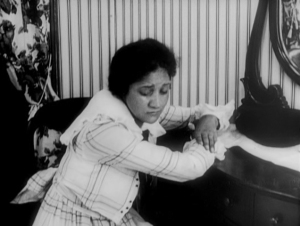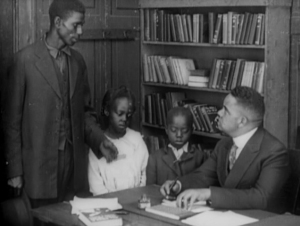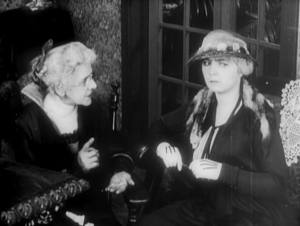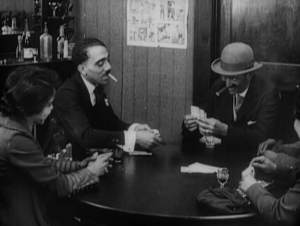An intense and controversial picture that deals with racism, lynching, crime and melodrama, this is the earliest surviving feature film from pioneering director Oscar Micheaux. Not an easy film to watch but a necessary one.
The Haunted
I’m going to come right out and say it: Within Our Gates is not an easy film to watch. It never has been. Released on the heels of Chicago’s Red Summer, Within Our Gates deals with racism in its many guises and graphically portrays lynching. There are reports of audiences walking out of the film if they were allowed to see it at all once the censors took a gander.

This is the second picture that pioneering black filmmaker Oscar Micheaux directed and the earliest one that has survived to the present day. Rediscovered in Spain, it has been restored and its title cards translated back into English but I should note that reels of material are still missing. This fact will, of course, be factored into the review.
This film is often cited as Micheaux’s response to D.W. Griffith’s racist epic, The Birth of a Nation. That film celebrated the myth of the happy slave, glamorized the KKK, used white actors in blackface to portray freed slaves and biracial men as rapacious beasts and applauded the suppression of black voters. A common defense of the film is to state that we need to look at context. Very well.

Within Our Gates is a complex, dark and emotional film. Like I said, not easy to watch. It starts out as a crime melodrama before layering on social issues and concluding with a harrowing flashback that includes the lynching of an innocent black family. (Attempts to pass federal anti-lynching legislation were very much in the news before and after the release of Within Our Gates. You can view an interactive map of documented lynchings and race riots in the United States here.)
The film opens simply enough with a love triangle. Sylvia (Evelyn Preer) is engaged to Conrad (James D. Ruffin) but her cousin, Alma (Flo Clements), wants him for herself. She intercepts a telegram from Conrad and arranges matters so that he sees the innocent Sylvia in an apparently compromising situation. Heartbroken, Sylvia travels south and gets a job at a school dedicated to educating low income black children.

Fulfilled in her new work, Sylvia is horrified to learn that the school is in financial trouble and will close unless $5,000 is raised immediately. She travels north to try to secure the funds and meets Dr. Vivian (Charles D. Lucas), a physician and burgeoning social crusader. In other words, he does a lot of research. Not the most cinematic activity.
Anyway, Sylvia sees a child about to be struck by a car. She pushes the kid out of the way but is struck herself. The owner of the car, the wealthy Mrs. Elena Warwick (Mrs. Evelyn), has Sylvia taken into the vehicle and driven to the hospital.

It’s worth noting that in 1917, Micheaux’s estranged wife, Orlean, was injured by a runaway horse and taken to the closest hospital, which turned her away because of her race. She had to be transported to a different hospital and succumbed to her injuries. In contrast, Sylvia receives prompt and caring treatment thanks to Mrs. Warwick.
It looks like the school will be saved but Mrs. Warwick wavers in her support after a visit from Mrs. Geraldine Stratton (Bernice Ladd), another well-heeled white woman. She feels that education would be wasted in this case and that Mrs. Warwick would do better to make a donation to a church that preaches a gospel of willful ignorance. Pure paternalism, in other words. (These scenes are interspersed with a very sardonic portrayal of a religious service.) However, Mrs. Stratton’s plan backfires when Mrs. Warwick decides that she will not donate $5,000 but $50,000 to the school.

The last third of the film is the section that is the most famous and shocking. A repentant Alma tells Dr. Vivian about Sylvia’s tragic past and we are shown an extended flashback. (Spoilers ahoy, obviously.) Sylvia’s adopted parents are framed for murder and lynched. One can easily understand why some members of the audience walked out—I couldn’t sleep after rewatching the film for this review and I was never anywhere near the Red Summer. The scenes are harrowing and heartbreaking and all too real. These aren’t fantasy situations, they were being played out every day.

This film explores the nooks and crannies of racism, from the charming townsfolk-turned-lynch mob to the more genteel, drawing room-friendly bigotry of Geraldine Stratton, who could easily have been D.W. Griffith’s sister. Finally, the rape scene of The Birth of a Nation is reversed with a biracial woman being attacked by a wealthy white southerner.
The African-American characters range from the kindly schoolteachers to the ruthless criminals to the simpering preacher, Old Ned, (Micheaux had very little use for hypocritical men of the cloth in his films) to the obsequious servant who sends Sylvia’s family to their deaths. Within Our Gates also rewards rewatches as it is deeply layered in rich detail, from the Old Ned’s code-switching to finding all of Micheaux’s digs at D.W. Griffith’s favorite tropes. (Do read this essay by W. Fitzhugh Brundage for a breakdown of how Micheaux made specific responses to Griffith.)
It is a movie that sticks with you, haunts you. It gets into your bones and your soul. It may be too much for some viewers today and I understand that but if you are able to see it, I strongly recommend that you take the opportunity.

This is an important film to me personally. Like most silent movie newcomers, my early exposure had been to polished Hollywood features and arty European films. They included adult subject matter, of course, and I enjoyed them very much but Micheaux’s raw direction and unvarnished social statements took my breath away. It exposed all the excuses for racism found in silent film as brittle, fragile and mean. I think it helped me on my path to radicalization.
The filmmaker himself is as interesting as anything on the screen. (An HBO biopic is said to be in the works.) A former homesteader, Micheaux published a semi-autobiographical novel and had tasted success as an independent publisher. An avid moviegoer, his first contact with the nascent African-American film industry was when he got in touch with George Johnson, who had founded Lincoln Films with his brother, Noble Johnson. Lincoln was ambitious but it had only released three-reel pictures and Micheaux dreamed of feature length, eight reels!

Micheaux did indeed adapt his novel, The Homesteader, into an eight-reel picture on a total budget of $15,000. This included advertising lithos and four prints. For the sake of contrast and because it would have used similar settings, Cecil B. DeMille’s 1918 version of The Squaw Man cost about $44,000. So, shoestring.
Of course, all of Micheaux’s films were famously low in budget and this didn’t allow for fancy sets or even retakes. He made the most of his money by hiring stage stars who had name recognition (good for box office) and acting ability (good for one-and-done shoots). She doesn’t fit this pattern but Micheaux was particularly fortunate in his leading lady, Evelyn Preer. She had received her early education in acting as a vaudeville performer and a street preacher and had previously starred in The Homesteader, her film debut.

The story of Within Our Gates takes many twists and turns but Preer is able to twist and turn with it, always remaining believable and appealing even when the plot throws a curveball. The rest of the cast varies in quality with Mattie Edwards giving a heartrending performance as the doomed adopted mother of Sylvia while James D. Ruffin practically gnaws at the drapes as the heartless Conrad. Bernice Ladd sends off a Gishy vibe that was surely intentional and William Smith is suitably noble as Gentry the detective.

The film has a rough, unedited quality to it (as do the other Micheaux films I have viewed) but this works to its advantage, giving it a documentary feel. It is also worth mentioning that Micheaux brought much of his real life to his films and his personal experiences color nearly every plot element and character. This is his truth, for better or worse, real events interpreted by a strong personality. The whole thing ends with a plea to patriotism and praise of bootstrapping.
The roughness of this production should also be forgiven once a little bit of context is understood. Filmmakers who catered to black audiences were cut off from the financial assistance and technical expertise of large studios—they had to be chief cook and bottle washer and they had to make sure that each film they released would pay for the next. Prints were an enormous expense and just to give you an example of how tight these budgets were, Oscar Micheaux printed four copies of The Homesteader total. Is it any wonder that it is considered a lost film?

To make sure that nothing happened to these precious prints, representatives would personally travel with them and hand deliver them to the theaters that had agreed to book them. So instead of just planning his new film, Micheaux would have to act as courier and also face down censor boards determined to snip as much as possible. In fact, Micheaux seemed to be invigorated by his battles with censors and gleefully turned their paternalistic attitudes against them.
All of this risks turning Micheaux into some kind of superhero but it is worth noting that he thrilled in sensationalizing controversial content, he was and is criticized for colorism and perpetuating stereotypes and his business dealings are not above reproach. Hagiographies are worthless and take away from the portrait of a complicated man and a complicated artist who was fighting an uphill battle to carve a place for himself in motion picture history.

Within Our Gates does not exist in vacuum and any time the film is mentioned, we must also take D.W. Griffith into account. Obviously, there’s nothing wrong with feeling that Griffith has problems but that his films are worthy of study. What irritates me are people who try to whitewash Griffith, absolve him of blame or act as though liking his films is required for silent movie fans.
One particular argument sticks in my craw and it’s directly related to the matter at hand: “D.W. Griffith invented the African-American film industry, if you think about it. Heck, he created Oscar Micheaux’s career and jump-started the NAACP due to the Birth of a Nation protests. We should thank him!”

I’m sorry, that thud was my jaw hitting the floor. Yes, this is real, people do make this argument. I have the Twitter scars to prove it.
Let’s break this down: When someone does a bad thing and other people react by doing a good thing in response, the person doing the bad thing doesn’t get credit for the good thing. If a reckless driver runs over a child at an unmarked intersection and the city council approves a traffic light as a result, the reckless driver doesn’t get a sign at the intersection thanking him for his service.

Oscar Micheaux worked hard and carved himself a niche in film history with his own two hands and with the help of other black film pioneers. He scraped together money for budgets, gathered settings and costumes and casts, marketed his pictures and fought censor boards tooth and nail. He was inspired to respond to a film that contained vicious slander and calls for racist violence but Griffith, the guy who made that film, doesn’t get karmic brownie points because of this fact.
Also, way to erase George and Noble Johnson from history, dudes, not to mention early African-American filmmaking in Fort Lee, New Jersey and the career of William Foster. Black Americans would have made movies with or without Micheaux. (Though film history would have been much more dull without him!)

Again, if someone else wants to watch a problematic film and discuss it in a rational manner, it’s no skin off my nose. And if they don’t want to see it at all, well, that’s their business. But when people go proselytizing about how if you don’t enjoy a film that contains racism you must be lacking as a movie fan, then I get annoyed. That’s quite a hill to die on.
The Birth of a Nation was never not political or controversial. In fact, I dare say that the controversy helped drive its box office success. Pretending otherwise and demanding that we ignore the racism when discussing the film is like wanting to discuss Basic Instinct but demanding that we ignore the sex and nudity as factors in its success. (Yes, I actually read one review in which the author wailed that nobody is capable of discussing Birth without bringing up racism. Um, yeah. Kind of like how people can’t discuss Jaws without bringing up sharks. A real mystery there, Sherlock.)

If more people are watching Within Our Gates than The Birth of a Nation, well, that’s okay by me. Oscar Micheaux’s films were denied a wide audience while he was alive but at least home video has leveled the playing field somewhat. I couldn’t be more pleased.
Examining Oscar Micheaux’s art is always worth our time as film fans. I remain impressed by his guts, nerve and determination to portray various aspects of the African-American experience on the screen despite the overwhelming obstacles he faced.
Within Our Gates is not an easy film to watch but it is a necessary film. Its power is still potent and it reaches across almost a century to touch viewers. The beautiful restoration does much to enhance the experience.
Where can I see it?
Within Our Gates is available as part of the Pioneers of African-American Cinema box set on DVD and Bluray. It is also available as a standalone DVD.
***
Like what you’re reading? Please consider sponsoring me on Patreon. All patrons will get early previews of upcoming features, exclusive polls and other goodies.

At this date, the film can be seen on Netflix as an episode of PIONEERS OF AFRICAN-AMERICAN CINEMA.
Yes, thanks. I don’t link to streaming services in the review proper because they change their content the way we change socks and there’s just no way to keep up with it. 🙂
Thank you for this powerful, unflinching review of Within Our Gates. I’ve watched it several times since getting the Pioneers boxed set- doesn’t get any easier the third time around, yet I want to watch it again after reading the MS review to go further into the areas you highlighted. And may I add that all performances remain just as compelling on a third or fourth viewing.
A Confession: I clicked on the link to an interactive map of documented lynchings and race riots, naively thinking that in my little neck of the California coastline there simply wouldn’t be any. Wrong, wrong, wrong! So many lynchings, primarily of Latino men. Horrifying to read the details of them all.
Thanks so much. Yes, the lynching map is such a terrible but necessary reminder of how many lost their lives. There’s a memorial project underway, if you haven’t heard about it already. It won’t bring anyone back but it will put the truth of their deaths in the spotlight.
https://www.theatlantic.com/magazine/archive/2017/11/a-national-monument-to-america-s-known-victims-of-lynching/540663/
Great review. And the book ‘Oscar Micheaux’ by Patrick McGilligan is an excellent bio on the director with thorough discussion of his surviving films.
Thanks!
The Birth of a Nation might be dangerous even today, if shown to mainstream audience. However, I want to challenge you with a Gedanken experiment: Let’s have The Birth an Empire made in Russia, where slaves were liberated at the same time. We see muziks drinking vodka and lusting for a countess. Finally, noblemen’s squad comes to rescue the civilization. Is this more acceptable because there’s no racism? Pure intellectually it shouldn’t be, but I suppose the American version would create a stronger evil awakening, a force that I don’t think Griffith quite anticipated. I see him more as stupid than bad. He was naive also in films where he tried to be on the good side. I believe Griffith wasn’t primarily driven by racism but by the bitter mindscape of a defeated confederate officer, and it’s most fruitful to see The Birth of a Nation as a document of that. Understandable, not acceptable.
I think a more useful comparison would to be comparing In the Heat of the Night with The Birth of a Nation. Griffith’s role in the racism of BOAN makes him MORE culpable than Thomas Dixon in many ways because he discovered a way to make the shrieking, cross-burning hate of the KKK palatable to drawing rooms across America. The story he tried to put across in BOAN is that freed slaves were better off under the care of a righteous master, the same nonsense Endicott spouted before he inspired some violent rednecks to attack Tibbs. Whataboutism doesn’t change that.
The notion that poor lil’ D.W. was walking along when WHOOPS if he didn’t make a racist film is disproved by Griffith’s own career. He was able to recognize that he spread vicious propaganda in Hearts of the World and made Isn’t Life Wonderful. Black Americans never got an Isn’t Life Wonderful from him, just more paternalism (The Greatest Thing in Life is often cited as his apology when it merely includes a white savior narrative). Sorry, Griffith isn’t getting off the hook. Later in life, he was asked if what was in BOAN was the truth. With no apparent sense of irony he quoted Pontius Pilate: “What is truth?” He refused to face what he had done. He had a newspaper. He knew about Chicago’s Red Summer. He just didn’t care. Making his dead daddy proud was more important than the lives of black Americans.
Further, I dare say that a non-Russian could never completely grasp the complexities of their revolution and that each nation’s story of oppression is unique. What I can say is that Griffith’s narrative of “they’ll rape our women” is still being used by racially-motivated killers in the United States. His poison continues to eat away. It’s cute to be academic but BOAN was and is dangerous.
I cannot resist commenting even though this has nothing to do with movies anymore. First, my previous comment had nothing to do with the revolution, but with the liberation of slaves in 1860s like in US. Second, history has always been a narrative vehicle of political leaders in Russia – much more than in most other countries – and therefore Russians typically have a very poor understanding of their own history. I love many aspects of Russian culture, but their history is a tragic story.
Forgive me but I think the American phrase “stay in your lane” applies here. I don’t tell other countries that they do not understand what is theirs, merely that I as an outsider have a different perspective. I have the pleasure of being acquainted with a large number of Russians and I can assure you that they understand their history very well. History is a narrative tool for political leaders in all countries. Look how well the Southern propaganda campaign and D.W. Griffith’s image repair have worked.
Ya know, Fritzi, if you’re not careful you’re gonna flunk Griffith Worship 101 and have to take the course all over again…
Now back to Within Our Gates. I’m very glad I read your review, it will inspire me to dig out my copy and watch it again. When I first saw it, I felt very guilty about not liking it – I thought it had merit, but it was a confused mess. I didn’t realize that there were scenes missing (you’d think I’d know that was a possibility, having studied film history all these years and knowing how much is lost. My bad). You’re probably right, this movie needs another viewing. I think I was so concerned about what was missing I forgot to see what was there.
And thanks for giving me a perfect thing to say to people when I tell them I watch Griffith films – a flawed director whose films, though bad, warrant study. That sums it up nicely – although I have to confess I really liked True Heart Susie. That was a really good film…
Yes, I see absolutely nothing wrong with finding a problematic creator’s work worthy or even enjoyable provided that it comes with a clear-eyed acknowledgement of the issues associated with their output. I think some of Griffith’s short work is quite brilliant, in fact. My problem is with Griffith fans who demand worship for him as a saint, try to let him off the racism hook because he was never actually photographed in a pointy hood, or try to deploy whataboutism. I read one hand-wringing article in which the author blamed college students for the lack of love for BOAN (never mind that colleges are generally the epicenter of D.W. worship) and whined that nobody was actually killed in BOAN protests so we’re getting worked up over nothing. This is usually followed up by “But Lillian Gish liked him!” to which I answer: Lillian Gish liked fascism. In the 1940s.
Within Our Gates absolutely needs context to be fully appreciated, especially since censors took their scissors to much of the film. That being said, Micheaux’s films are generally better appreciated if the viewer does not expect a three act structure. They’re more of a stream of consciousness at times.
What I find interesting is the people that complain that critics always bring up racism when discussing BOAN and miss the other aspects of the film. OK, I can play that game, too…it’s far too long, it’s sloppily edited in some places, it often lingers on unimportant details, it has some glaring errors that you wouldn’t expect from a “brilliant” director, the characterizations lack subtlety (when they’re not completely over the top), it’s extremely melodramatic…did i mention that it’s way too long? There, I just critiqued BOAN without once mentioning race.
Thing is, they really, really do not want to admit that the racist content was and is a draw for the film. It’s a feature and not a bug for a certain segment of the audience. That’s not to say that anybody who finds something to admire in the film is racist, merely that BOAN was being used for KKK recruitment as late as the 1970s. (It could still be used for all I know, the 1970s is just the latest documented instance I can find. My source is Black Klansman by Ron Stallworth, which is exactly what it says on the tin and is getting a film adaptation of its own because OF COURSE, Hollywood isn’t stupid, it’s a great story. Black cop goes undercover in a white supremacist group– true story– and part of the welcome package is a screening of BOAN.)
It’s fine to be academic and I’m all for it when we’re talking about, say, the uprising of the Burgundians or something but people are still dying over here.
But yeah, BOAN definitely indulges in DWG’s worst non-racist instincts including electric purple prose. I find that I like him best when he works on smaller stories (that don’t involve rape and abuse) as he was much better as a miniaturist.